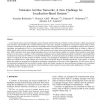Free Online Productivity Tools
i2Speak
i2Symbol
i2OCR
iTex2Img
iWeb2Print
iWeb2Shot
i2Type
iPdf2Split
iPdf2Merge
i2Bopomofo
i2Arabic
i2Style
i2Image
i2PDF
iLatex2Rtf
Sci2ools
COMCOM
2008
2008
Vehicular Ad Hoc Networks: A New Challenge for Localization-Based Systems
A new kind of ad hoc network is hitting the streets: Vehicular Ad Hoc Networks (VANets). In these networks, vehicles communicate with each other and possibly with a roadside infrastructure to provide a long list of applications varying from transit safety to driver assistance and Internet access. In these networks, knowledge of the real-time position of nodes is an assumption made by most protocols, algorithms, and applications. This is a very reasonable assumption, since GPS receivers can be installed easily in vehicles, a number of which already comes with this technology. But as VANets advance into critical areas and become more dependent on localization systems, GPS is starting to show some undesired problems such as not always being available or not being robust enough for some applications. For this reason, a number of other localization techniques such as Dead Reckoning, Cellular Localization, and Image/Video Localization has been used in VANets to overcome GPS limitations. A c...
| Added | 09 Dec 2010 |
| Updated | 09 Dec 2010 |
| Type | Journal |
| Year | 2008 |
| Where | COMCOM |
| Authors | Azzedine Boukerche, Horacio A. B. F. de Oliveira, Eduardo Freire Nakamura, Antonio Alfredo Ferreira Loureiro |
Comments (0)

